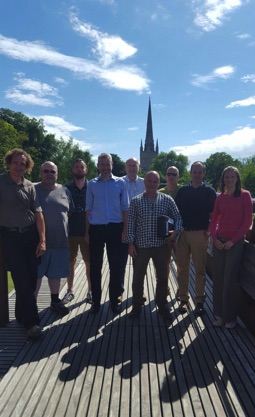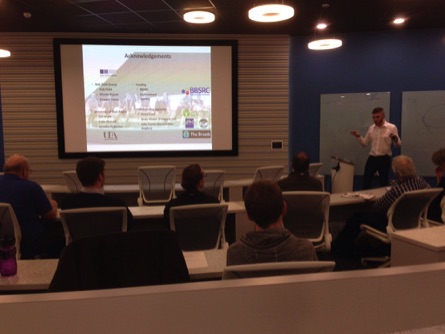
Community
Fishtrack work closely with the wider community in order to build and develop better understanding and appreciation of the natural environment and its ecology.
Partnership
We have developed a strong track record of partnership working and we work closely with Government Agencies, NGO’s and non-profit organisations to develop high quality services and applied research that delivers excellent results.
We are involved with work within the academic sector, providing opportunities and assistance to students. We provide technical input, advice and field work towards research projects.
We work with interest groups and specialist organisations such as the Institute of Fisheries Management (IFM) and local groups such as the Broads Angling Services Group (BASG) and various rivers trusts such as: Westcountry Rivers Trust and the Waveney Rivers Trust
Outreach- Community working
Fishtrack have developed successful applied research projects with the angling community. We develop working relationships with angling clubs, specialist groups, interest groups and Rivers Trusts, resulting in a series of successful project outcomes:
More than 450,000 freshwater cyprinid fish are stocked into rivers annually to enhance fish communities. Understanding the movements and fate of these fish is rarely undertaken. Our work with the angling community resulted in a 5 year study assessing the fate and movements of stocked barbel in collaboration with Norfolk Anglers Conservation Association, Environment Agency (EA), and local landowners. Understanding of fish movement and behaviour, habitat influence and fate of fish were all improved as a result of the outputs of the project. Publication within peer reviewed literature is underway.
Sampling apex predators in large shallow lowland lakes is inherently difficult. Consequently population studies are rare and often inaccurate. Collaboration with specialist predator anglers Norwich & District Pike Club & Pike Angling Club of Great Britain (PACGB & NDPC), EA, as well as interested wider community angling clubs such as Martham Angling Club and members of the Trinity Pike Conservation Group, resulted in substantial in-kind contributions totalling >£30,000/yr and angler led capture of fish. Significant funding and technical support was provided from the EA. The collaboration has delivered a large scale project on pike population dynamics, growth rates, validation of scale analysis and gender ratio’s within the Norfolk Broads. Collaborative partnership working incorporating citizen science has delivered excellent results. This was one of the largest studies on northern pike in the UK, culminating in peer reviewed publications and reports with further work to come.


Academic collaboration
Fishtrack provide opportunities for learning and development for students (under and post-graduates), where we mentor and involve people in actual projects, often enabling them the opportunity to contribute to applied research or commercial success. We provide assistance and technical support for PhD’s and assist with project designs to enable successful completion of studies
Barbel movements on the River Teme, part of a wider study on barbel populations and ecology within the Teme and Severn catchment. We provided technical support, surgical and fish welfare services and designed the hydroacoustic component of the study.
Pike and zander predator study on the River Severn, incorporating a PhD and study into predator movements and behaviours. through are expereinced input in design and project set-up, we provide the technical resilience along with the surgical and tracking skills for this component of the study.
Development of post graduate students in fishery survey techniques and data handling. Fishtrack is pleased to have offered these opportunities, enabling development of field based skill sets, first hand experience of applied research and working within a commercial setting.
Opportunities for undergraduates. We offer some opportunities for undergraduates to work on a variety of projects, assisting with field work, collecting data and database construction and preliminary statistics.
Cross-Agency and Academic collaboration
We have an established track record developing and maintaining collaborations with Government Agencies, Research Institutes and Universities to drive joint projects to successful conclusions.
Biological control of invasive signal crayfish. Invasive non-native crayfish have the potential in certain rivers to release significant sediment loads back into the rivers, cause destabilisation of banks, exacerbate erosion and inter and intra specific conflicts further releasing sediments. A collaborative study has been established involving Loughborough University, EA, Fishtrack, and Lincolnshire Rivers Trust. The study is part of a PhD looking at sediment release into rivers from signal crayfish and the potential to control these animals with introduction of eel as predators. Under Professors Steve Rice and Paul Wood (LU) and supported by the EA (funding and fieldwork) and Fishtrack (fishery project design and monitoring (telemetry and trapping) and surgical services), the project commences this year, with potential to run for 5-6 years.
Biomanipulation effects upon fish communities and wider fish movements within an interconnected system of the Norfolk Broads. The study is part of a PhD incorporating wider research interests between Natural England, EA, Fishtrack and Bournemouth University. This multi-collaborative project is funded by NE, EA, BU and Fishtrack. Tagging and tracking will commence this year with arrays of hydroacoustic receivers being deployed as part of wider fish monitoring research interests, this aspect being designed and supervised by ourselves.
Angling
Angling within the Norfolk Broads is estimated to be worth approximately £100,000/yr to the local economy (Lane, 2016). The impact of fish mortalities in this area can have profound affects on tourism and particular angler related tourism. Mass fish mortalities occur as a result of saline incursion and toxin releases from algae. Working in collaboration with the Field Group under Professor Rob Field (John Innes Centre, Iceni Diagnostics) the EA, NE, NDPC, PACGB, Fishtrack, and Johannes Hagstrom (Linneaus University) an umbrella project was developed to better understand the mechanisms of toxin release by the brackish water alga, Pymnesium parva and its impact upon the fish community and wider ecology of the Thurne system, as well as an assessment of current management techniques and background water chemistry. The project has seen significant progress with several groundbreaking discoveries. We are confident that our results will see the development of effective management strategies that will protect fish stocks and the wider ecology of the area in the near future.
Academic and wider research collaboration
We work with the academic sector, supporting PhD research and assisting with field studies and providing technical support. Our work reaches past traditional boundaries to new areas of research, where results have impact within our own environmental and ecological sectors:
Services
Fish Tracking and Telemetry Monitoring
Fisheries Surveys, Novel and Traditional
Fish Rescues and Removals
Commercial Services to Industry
Fisheries Management, Advice and Design
Hydroacoustics Sonar Surveys
Fish Tagging, Surgery and Welfare
Crayfish Surveys
Fish Passage Assessment
Biomanipulation and Lake Restoration
Phase 1 Habitat and extended surveys
Bat, Otter, Badger and Watervole Surveys
Collaborations, Partnership Working
Outreach, Fishtrack in the Community
Publications, Outputs from our work
Clients, Contacts and useful Links
Outreach- Education
Fishtrack volunteer with schools to help inspire young people to pursue careers within the science and ecological sectors. We attend careers days and provide advice and talks to stimulate thought and enable students to see their potential within these sectors. We encourage and challenge students, raising their awareness of the natural environment and its ecology and how inter dependant we are upon our interactions with it.